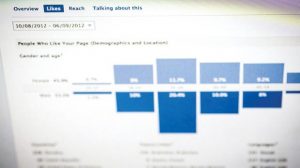We like Facebook – Are the Maltese fixated with facebook?
3 min readThe Maltese have always been a friendly nation. But are we getting too friendly on Facebook?
Article written by Ian Vella, Published on the Sunday Times (TechSunday) 14th April 2013

Although Facebook does not publish any official statistics about its used demographics, we can still get a good idea of how many Maltese are on this so-cial media platform by using Face-books advertising system. This online platform allows any-one to design an advert and target a particular demographic. Facebook can cater for such needs and will supply statistics about the amount of users that can be reached. Facebook advertising system can also be used to see how many people in Malta are on Facebook.
The answer is astounding – 216,100 Maltese users are registered on Facebook. These are almost equally split into 104,120 females and 109,520 males – the remaining 2,460 do not specify their sex in their profile. With regards to age distribution, the younger generations are the most active on Facebook, with 25,720 Maltese users under the age of 18.
Of these, 12,720 are male and 12,980 are female. A total of 36,100 (18,840 male and 17,160 fe-male) Maltese Facebook users are aged 18 to 22. The older generations are not very active on the social media platform – still, 9,260 Maltese Facebook users are older than 63. Currently, Malta’s real population stands at 409,836 and 68.5 per cent fall in the 15 to 64 years bracket (indexmundi.com). Of these, 142,006 are male and 137,803 are female.
When we consider that for the 15 to 64 age bracket in Malta, 203,200 out of 279,809 people have a Facebook account, we can conclude that around 72.6 per cent of the Mal-tese adult population have a pro-file on Facebook. Let us now compare how much of the adult population in Malta (age bracket 15 to 64, both inclusive) are on Facebook and how we compare to other neighboring countries and to the most industrialised nations. In Cyprus, 68 per cent of the population have a Facebook account, while in Luxembourg, the rate is 63.25 per cent. The UK scores a high 74.45 per cent, as does the US, with 74.56 per cent. Austria and Germany have a lower penetration rate, with 50.43 per cent and 44.56 per cent respectively. Bottom of the list are Libya and China, with 18.48 per cent and 0.06 per cent respectively. It seems that when compared to other countries, Malta’s Face-book penetration is quite high. In fact, we are the third most active population on Facebook, after the US and the UK.
Facebook’s advertising system allows us to extract further data. For instance, 116,300 people in Malta access Facebook from their mobile device – this means that 53 per cent of Facebook users in Malta are always connected, even when they are away from home.
66,120 of these use an Android phone while 47,880 use a device running Apple’s i0S. We can also see which sports Maltese Facebook users follow. It doesn’t come as a surprise that the majority – 63,200 – follow football regularly, while 17,760 prefer motor sports. Tennis also has a healthy following and is the preferred sport for 8,500 users. The Maltese are spending more and more time updating their Facebook status and sharing the most intimate details of their life online. When one considers that people upload photos of their children, personal finances and political affiliations, a number of ethical questions are undoubtedly bound to arise. There are also se-curity issues – most users don’t even bother to ever visit their privacy settings page. This leaves them exposed to online stalkers.
In recent years, Facebook has taken steps in the right direction and is trying to educate its users on the importance of only sharing information with people who are close friends. Nevertheless one wonders how many users – especially those aged 50 and over – who were born before personal computers entered our homes, know how to properly protect their private information. Some are unknowingly sharing certain personal details of their life with everyone. From a business point of view, such information is a gold mine for advertisers, especially since these can specifically target their potential customers. A business selling pushchairs, for instance, can easily advertise to women who are expecting a baby or who have children younger than two. Facebook gives us an exact figure of 23,200 females who fall in this targeted bracket – a company’s advert can reach each one of these users for just 20 cents per click.
This is way more cost effective than any other form of traditional advertising. When one considers that thou-sands of Maltese adults are accessing Facebook either through their smartphone, home computer or tablet, can advertisers still ignore the power of Facebook?
Ian Vella




